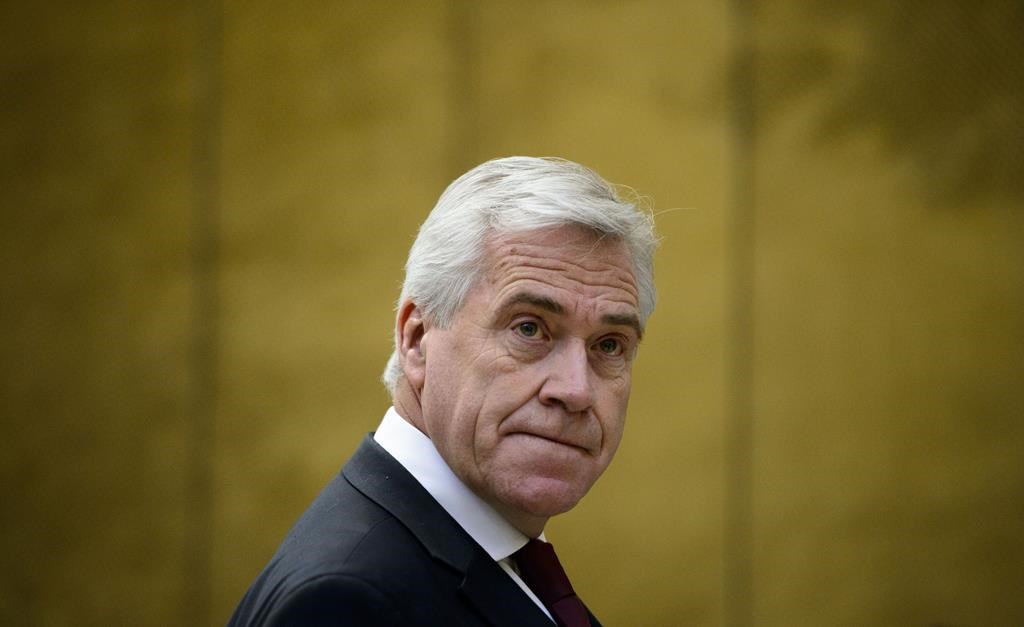Newfoundland and Labrador tabled an optimistic election-year budget Tuesday, taking stock of economic improvements since the provincial Liberals took office and resisting any tax hikes.

The $8.4-billion spending plan is set against a forecasted deficit of $522 million, a number that’s been steadily declining from more than $2 billion when the provincial Liberals came to power in 2015.
Provincial net debt is expected to reach $13.5 billion in the small province of about 529,000 people.
Finance Minister Tom Osborne said the government plans to diversify from over-reliance on oil revenues to avoid future crashes, but he still stressed the industry’s importance to province’s fiscal future.
“What we’ve done for the past three years is try and create a more diverse economy in the province, not to understate the importance of oil and gas,” Osborne said.
“We’ve taken a very deliberate approach to diversify and create other opportunities.”
READ MORE: N.L. Liberals fighting to stay in power as provincial election looms
Those other opportunities include expanding the mining and aquaculture sectors and funding to support newcomer integration and entrepreneurship.
And with an election call imminent, the document titled “Working towards a brighter future” could stand as more of a financial update than an official budget.
Premier Dwight Ball has promised an election will come before the end of June, but has not said whether the writ will drop before the budget is passed.
When asked whether the budget stands as an election platform, Osborne said the election call is the premier’s decision, but he stands by his department’s plan.
“Is it a good budget, does it serve the people of the province well? Yes,” he said.

Get breaking National news
WATCH: Stranded seals block roads, driveways, doors in Newfoundland

Spending plans include $594.3 million in construction and renovations to schools, healthcare facilities, new housing projects and other infrastructure projects.
The budget also accounts for “one-time expenses” like $6.3 million for this year’s election and $11.1 million for inquiries, including one ongoing into the over-budget and behind schedule Muskrat Falls hydroelectric project in Labrador.
The plan does not include tax or fee increases; the government has eliminated a sales tax on auto insurance as “steps to provide consumer relief” following steep tax increases in recent years that the Liberals stressed were necessary to get finances back on track.
Some savings came from government job cuts, referencing more than 900 positions cut since 2016.
The budget speech’s optimistic tone comes hand in hand with references to the recently revised Atlantic Accord, a key federal-provincial agreement divvying up offshore oil revenues.
READ MORE: Renewed Atlantic Accord provides big boost to N.L. Liberals ahead of possible election
The newly negotiated deal promised $2.5 billion for the province from the federal government’s stake in the Hibernia offshore oil field in annual instalments over 38 years, with $134.9 million coming to Newfoundland and Labrador in 2019.
The agreement’s revenues create a surplus for the year of $1.9 million — the province’s first since 2011 — but Osborne cautioned that the surplus comes mostly down to accounting practices.
The financial outlook projects deficits over the next three fiscal years, staking hopes on a potential return to surplus by 2023 if oil prices stay between US$65 and US$71 per barrel.
The government projects a 12 per cent increase in oil production over the next year at a price of US$65.
The government has announced plans to rapidly increase the scale of its offshore oil and gas industry. Natural Resources Minister Siobhan Coady said Tuesday the sector is experiencing a “renaissance of exploration.”
WATCH: Husky Energy’s oil spill off NL created environmental and political mess

Osborne maintained his government’s position that the province’s oil is cleaner than other Canadian products and said it will continue producing it while fossil fuels are in demand.
“Oil is still very much part of the future,” Osborne said.
“For as long as people are driving cars or flying planes, or as long as our products are shipped by ship and use fossil fuels to get here, we need to use oil.”
Osborne said he’s confident his government will form government again, saying voters would have to “think long and hard” before voting the Tories back into power.
“We’ve put the province back on a sound fiscal footing,” he said. “We’re turning the corner.”







Comments
Want to discuss? Please read our Commenting Policy first.